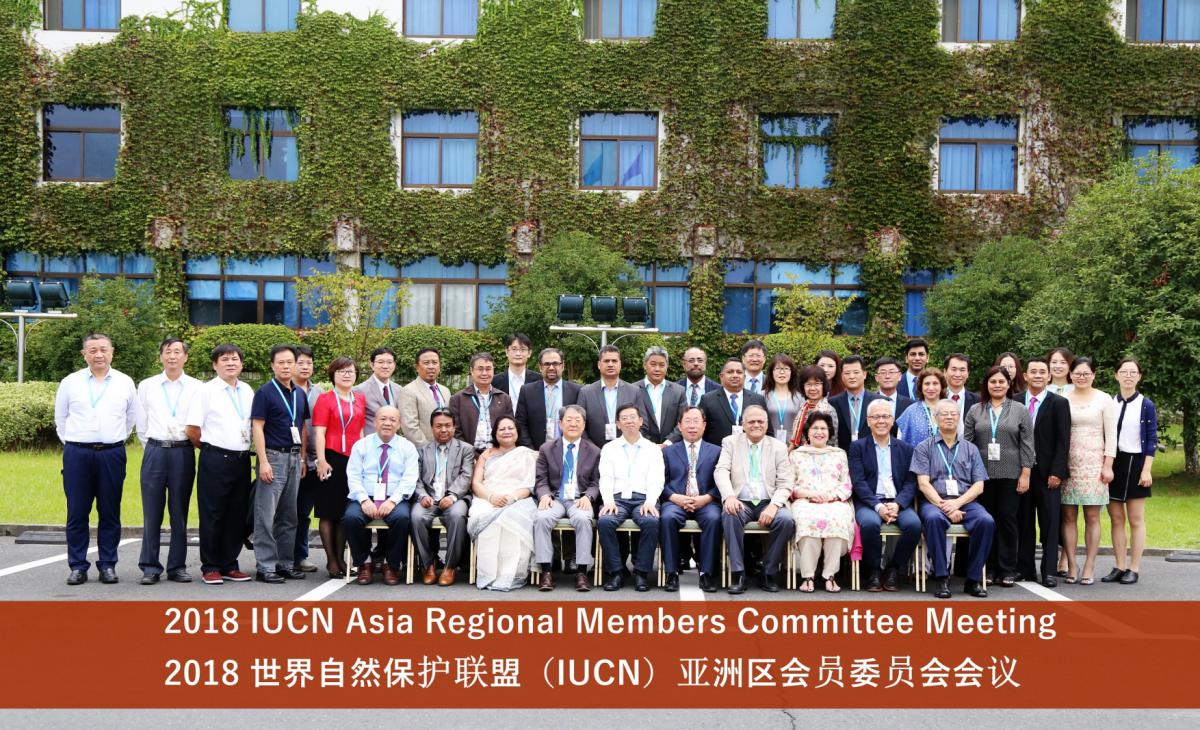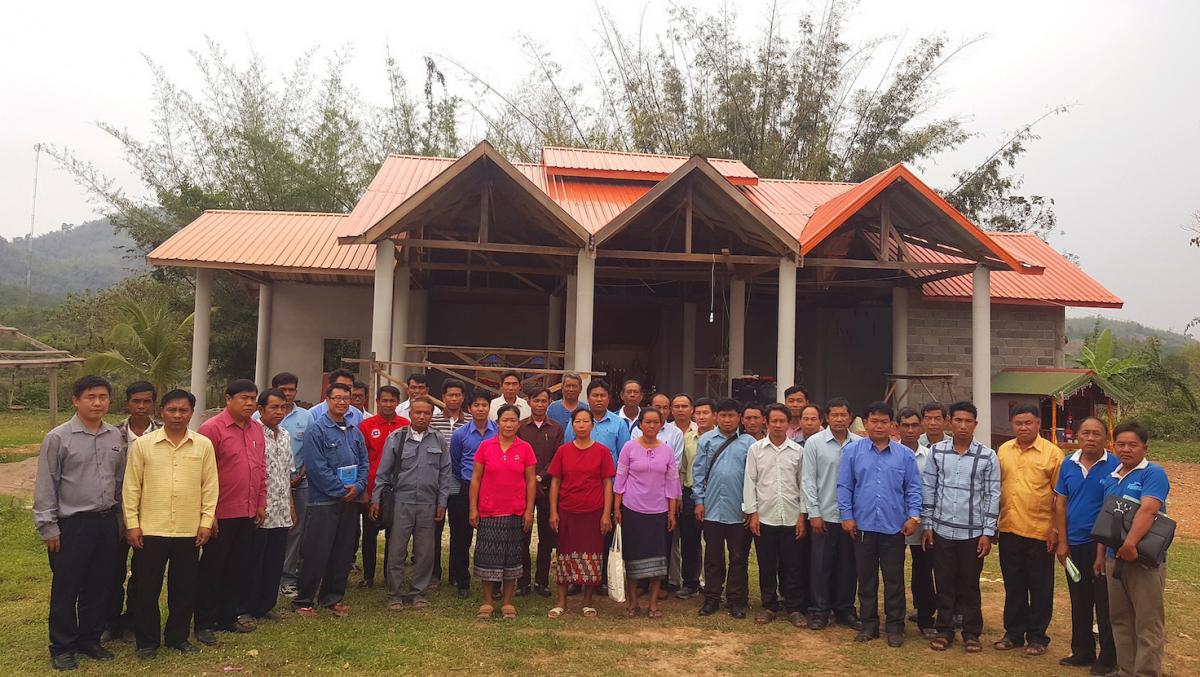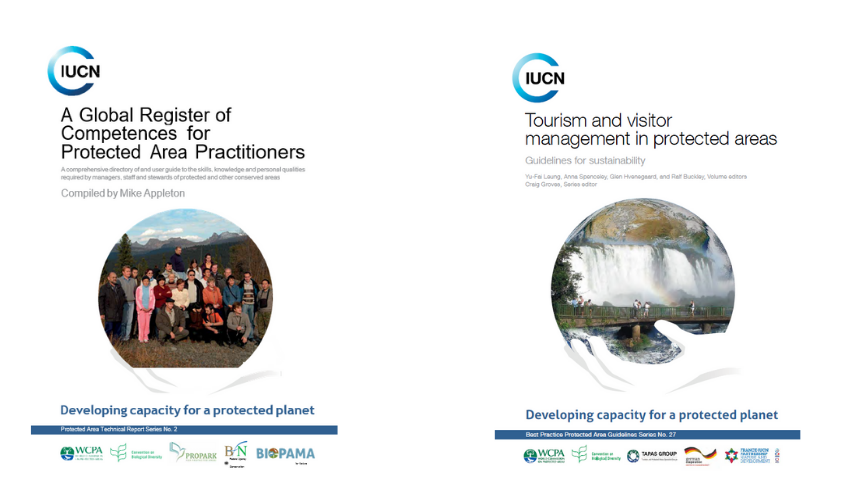IUCN Asia Regional Members Committee Meeting
The Asia Regional Members Committee (ARMC) meeting was held in Huangshan City, Anhui Province, China from 11 to 12 September under the chairmanship of Prof. Ma Keping. The meeting was supported by the Bureau of International Co-operation, Chinese Academy of Sciences and the Mt Huangshan Scenic Area Administration Committee (HSAC).

Asia Regional Members Committee Meeting participants
Photo: © IUCN
The meeting provided an opportunity to review the progress of IUCN Members’ activities, Commissions and the Secretariat, and to deliberate on how the ARMC could further strengthen its efforts to tackle environmental challenges. To celebrate IUCN’s 70th anniversary, Ms Aban Marker Kabraji, Regional Director for IUCN Asia and Director of the IUCN Regional Hub for Asia-Oceania gave a presentation on IUCN’s contribution to nature conservation over the last 70 years.
The meeting was attended by Members of the ARMC from 16 countries, including Chairs of the National Committees or their nominated colleagues; representatives of Members from other countries where National Committees do not exist; the Regional Councillors from Asia (Prof. Youngbae Suh, Prof. Amran Hamzah and Mr Mangal Man Shakya); the Regional Vice Chair; the IUCN Commission on Environmental, Economic and Social Policy; and the Secretariat.
Mr Wenda Wu, Executive Director of Mt Huangshan Scenic Area Administrative Committee (HSAC), welcomed all the participants in his opening remarks, and explained the importance of Mt Huangshan as a significant natural reserve that enjoys the status of UNESCO Heritage Site, World Biosphere Reserve and World Geopark.
IUCN President Zhang Xinsheng gave a welcome speech through a recorded message, as he was not able to attend the meeting due to health reasons. President Zhang thanked Prof. Ma for organising this meeting in Huangshan, which is considered one of the most beautiful cities in China. He welcomed all participants of the Asia Regional Committee, Regional Councillors and Commission representatives. President Zhang also congratulated IUCN Vice President Malik Amin Aslam Khan on his appointment in August as Adviser on Climate Change to the Prime Minister of Pakistan, with the status of a Federal Minister. In his concluding remarks, the President said “Let us all promise today that through our responsible action, we will make this world a better place for humans and nature to live in peace and harmony.”
Senator (r) Javed Jabbar, Founding President of Baanhn Beli and IUCN former Vice President, spoke on behalf of Mr Amjad Rashid, the Chair of the Pakistan National Committee, who could not attend due to unavoidable reasons. He emphasised the importance of promoting conservation at a time of new geopolitical and geo-economic uncertainties. Senator (r) Jabbar commended the People's Republic of China for demonstrating that regardless of differences in political policy, the conservation cause is truly one that can and must unite us. He also said that he was privileged to attend the meeting on behalf of Global Vice President Mr Malik Amin Aslam, who could not attend due to his recent appointment as Advisor on Climate Change to the Prime Minister of Pakistan. Senator (r) Jabbar conveyed greetings from Mr Rashid and Mr Aslam, and also acknowledged the support of Ms Kabraji, who pioneered the introduction of IUCN to Pakistan and to the whole region.
IUCN Regional Councillor Prof. Youngbae Suh made brief remarks and welcomed all the participants to the meeting, which was held back-to-back with the Tripartite Partnership Meeting of Members from China, Japan, and Republic of Korea in Beijing.
IUCN Regional Councillor Prof Amran Hamzah thanked Prof Ma for the opportunity to participate in this meeting. He said that he looks forward to discussing how Asia can contribute to the global conservation movement.
IUCN Regional Councillor Mr Mangal Man Shakya thanked Prof. Ma for hosting this meeting, and was very keen to know how IUCN Members could contribute to the conservation efforts collectively.
Ms. Aban Marker Kabraji thanked the host Mr Wenda Wu for the hospitality and for hosting the meeting in this World Heritage Site. She mentioned the importance of the meeting, as participants will be looking at what IUCN’s achievements have been between Congresses, what we plan to do at the next Congress, and what should be part of the next programme beyond 2020.
Ms Kabraji highlighted some of the challenges faced by Asia and said that Asia has some of the worst environmental issues. For example, Asia is the biggest contributor to plastics in oceans. She pointed out the need to recognise that China has enormous impact on the economy. She also cited the Belt and Road Initiative (BRI), the impact of which could be both beneficial and worrying. She added that we must recognise that while this initiative brings enormous potential, we must think about how we as IUCN Members can work with the Chinese Government to ensure that we bring the best of China’s contribution to Asia and to the rest of the world, and also what we can achieve from our particular perspectives in countries.
During the meeting, several presentations were made by participants, including a presentation by Prof. Ma Keping on “Post 2020 biodiversity conservation framework; progress and possible structure.” Members from each country also presented on the progress of their activities, contributing to the three programme areas of IUCN. Ms Meher Noshirwani, Regional Vice Chair in Asia for the IUCN Commission on Environmental, Economic and Social Policy (CEESP) presented an overview of CEESP and its engagement in Asia.
Dr TP Singh, Deputy Regional Director for IUCN Asia, provided an update on the IUCN Programme in Asia and also made a brief presentation on the IUCN Asia Regional Conservation Forum (RCF) which is due to be held in 2019. He explained that RCF is one of Asia’s most important regional conservation events, which brings together states, government agencies, NGOs, scientific and academic institutions, development agencies and the private sector to discuss the current situation related to biodiversity conservation and sustainable development in Asia, and the ways forward.
Senator (r) Javed Jabbar offered, in principle, to host the RCF in the last quarter of 2019 in Pakistan. He further clarified that the offer is subject to later formal confirmation after further consultations (and mobilisation of required funds).
Group discussions were also held at the ARMC meeting, covering the following topics in which participants made useful contributions and recommendations:
- How to enhance the strength of IUCN Asia?
- Ways National Committees can mobilise Members
- Successful cases for the implementation of IUCN Work Programme 2017-2020
- Conservation Strategy and policy toward 2020 and post 2020
- How will Asian countries participate in the CBD COP 15
For more details, please contact:
Raj Kumar
Membership Manager, Asia
IUCN Asia Regional Office
63 Sukhumvit Soi 39
Klongton - Nua, Wattana
Bangkok 10110, Thailand
Tel: ++6626624029 Ext: 117
Fax: ++6626624388
www.iucn.org/asia



